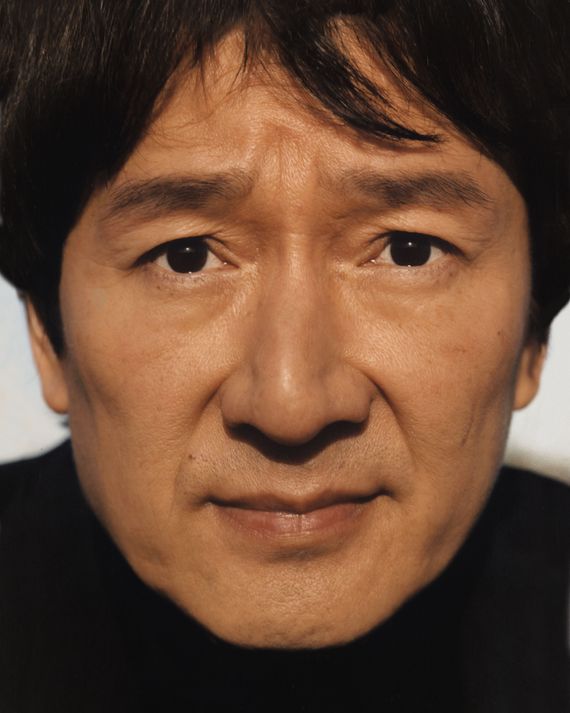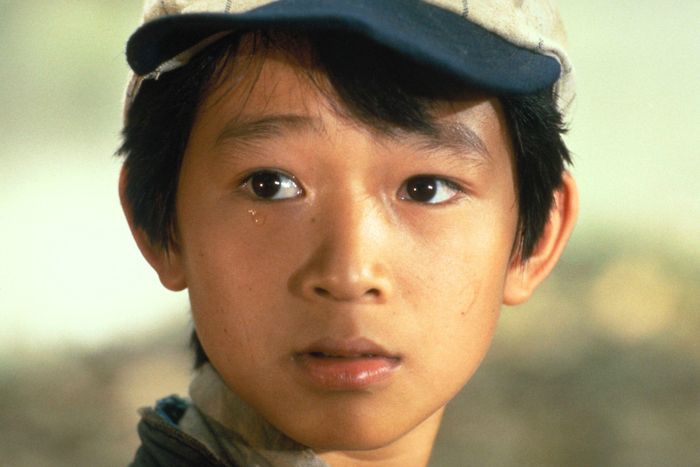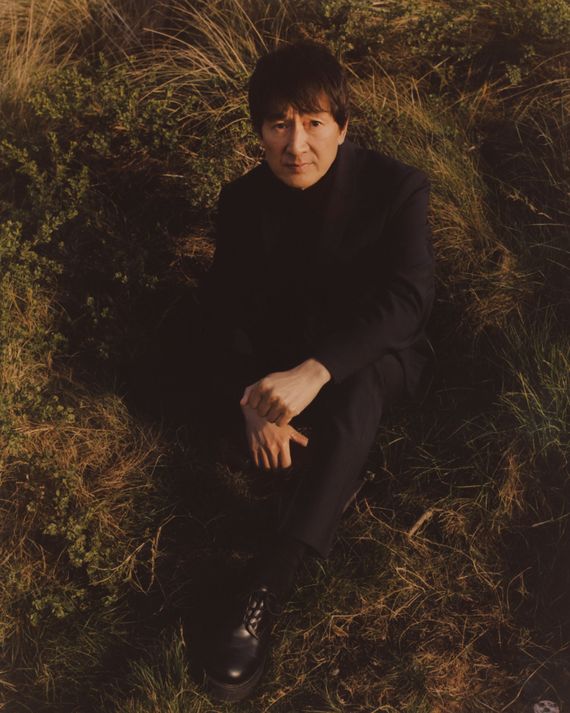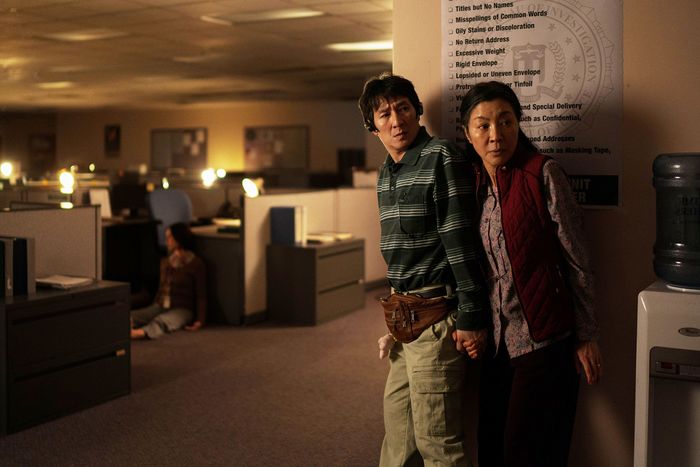
This article was featured in One Great Story, New York’s reading recommendation newsletter. Sign up here to get it nightly.
Ke Huy Quan swung that damn fanny pack everywhere. It hung from an unusually long strap, and for weeks Quan swung it in the kitchen, he swung it while watching TV, he swung it all over the house. “I broke so many things,” he says, laughing. “My wife was not too happy about it.” But Quan was determined to master his technique because that fanny pack plays the weapon in his big action scene in Everything Everywhere All at Once. Up to that point in the story, the film has mostly been a domestic drama, and Quan’s character, Waymond Wang, a meek, soft-voiced husband, father, and laundromat owner. When things suddenly go haywire, he tears off the fanny pack he’s been wearing and whips it around with breathtaking expertise, using it in the style of a wushu rope dart to subdue a group of IRS security goons.
Everything Everywhere turns out to be a deeply emotional, multiverse-hopping sci-fi action-fantasy about life, family, culture clashes, and the cosmos. It’s the second feature directed by Daniel Kwan and Daniel Scheinert, who work together under the moniker Daniels, and as it proceeds, Quan’s performance explodes into different personae, all of whom frantically circle around Waymond’s wife, Evelyn (Michelle Yeoh), a harried Chinese immigrant who has just discovered she may be the only being powerful enough to prevent the forces of nihilism from destroying all of existence. Evelyn is the protagonist, but Waymond is in many ways the film’s heart — and the first time he appears onscreen, you may realize you’ve seen Quan before. He looks a little older, a little wearier, but his face is seared into the brain of anyone who grew up in the 1980s: When he was 12 years old, Quan scored a lead role in one of the biggest movies of the decade, playing the wisecracking street-urchin sidekick Short Round in Steven Spielberg’s Indiana Jones and the Temple of Doom.
While the film was a huge hit in 1984, it was also controversial, criticized for its gore and its outdated, exotic-cultures-of-Asia story line. Still, kids loved Short Round. We wanted to be Short Round, the only child lead in a series we worshipped. A year later, Quan played the boy inventor and intrepid adventurer Data in another Spielberg-produced blockbuster, The Goonies. “The friend group I had in middle school was obsessed with The Goonies — we would watch it every week. I was the Asian kid of the group, so whenever we would go out and play pretend, the mantle of playing Data was put on my shoulders,” says Kwan. “And I loved it. That character is so smart and so brave and so weird. We didn’t have many great role models.”
But then Ke Huy Quan grew up. It didn’t take long to discover that Hollywood roles for Asian men were few and far between. He did a few films in Asia. He left acting behind and went to film school, then started working behind the scenes. Decades passed. Not until Quan saw the success of Crazy Rich Asians in 2018 did he allow himself to think about performing again. “I was happy working behind the camera, but this entire time something felt missing,” he says. “When those opportunities dried up, I spent a long time trying to convince myself that I didn’t like acting anymore. I didn’t want to step away with the feeling that it was because there were no opportunities. I was lying to myself.”
He hired a new agent, and within just a couple of weeks he wound up with the script for Everything Everywhere. He stayed up all night reading it, waking his wife with shrieks of laughter: “I had tears running down my cheeks. I said, ‘I think this role was written for me!’”
It wasn’t — but the Daniels became taken with the idea of reviving Quan’s acting career. “The hardest thing about finding this role was that it required a lot of different skill sets,” says Kwan. “He had to be able to speak Cantonese, Mandarin, English. He had to know martial arts. But he also had to be an incredibly believable sappy pushover.” The directors imagined someone like Jackie Chan, who can serve as sweet comic relief one minute and perform dazzling feats of heroism the next. “One day, on Twitter, I saw a picture of Ke Quan as Short Round,” says Kwan. “My brain was like, What is that guy doing right now?”
I meet Quan, now 50, on a chilly, windswept day in Los Angeles’s Chinatown. He’s chatty and energetic as he shows me around this neighborhood, where his family — including his mother, father, and eight siblings — settled after arriving in the U.S. as refugees from Vietnam in 1979, when Ke was 8. The family, which has roots in Hong Kong and mainland China, tried to get out of Saigon twice. They succeeded by splitting up: Ke’s mother and three of the kids went to Malaysia. Ke, his father, and the rest of Ke’s siblings boarded a boat with thousands of other people; it was among the largest vessels involved in what was known as the “Boat People” crisis of the late 1970s and early ’80s. They landed in a Hong Kong refugee camp.
“It wasn’t very big. We had a chain-link fence around the building, and it was just makeshift beds right next to each other,” Quan says. “There were guards to make sure we wouldn’t get out.” He pauses. “I don’t think I’ve spoken about this stuff in 30 or 40 years. I knew that it was tough. I knew that was not my home. I knew we left a home behind. I knew I missed my brother. I missed my mom.” They were stuck there for a year. He remembers the elation of getting U.S. visas and flying to L.A., where the family was reunited. It was the first and most important plane ride of Ke’s life.
We make our way to the historic Chinatown public school Castelar Elementary, where Spielberg’s casting director, Mike Fenton, discovered Ke in 1983. The Temple of Doom team was desperate, searching all over the world — Hong Kong, Singapore, London, New York — to find the right child to play Short Round. But, strangely enough, they had not tried L.A. Ke’s younger brother David tried out for the part first. Ke had to wait while David auditioned, and he couldn’t resist coaching his brother: “I didn’t know what the hell was going on. I was like, ‘Hey, David, do this, do that!’” Fenton asked Ke if he would like to try out too; the first time he auditioned, his mother made him wear a three-piece suit “with a little gold chain hanging off the pocket,” he remembers, chuckling. “I’d never seen Star Wars. I’d never seen Raiders of the Lost Ark. I walked in the room, and it was just three grown men with a beard and a mustache.” They were Spielberg, George Lucas, and Harrison Ford. Three weeks later, Ke and his mother were on a plane to Sri Lanka.
A few other parts followed: The Goonies; one season of the sitcom Together We Stand, in which Ke played the adopted son of Elliott Gould and Dee Wallace; a season and a half as a transfer student on the high-school sitcom Head of the Class. Soon, though, the work dropped off. Quan remembers hanging out with other young actors at parties and feeling embarrassed hearing them talk about all the auditions they were going to. “‘Yeah, this week I just have three auditions. I got five next week!’ And I’m thinking, Man, the last audition I had was six months ago.”
But he continued to fight — literally. Quan loved Jackie Chan and Sammo Hung movies growing up, and he’d been training with a Tae Kwon Do master ever since he started learning the martial art on the set of Temple of Doom. He leads me to an abandoned shopping center once called Bamboo Plaza, where we sit on some benches in an atrium surrounded by pigeons and long-shuttered businesses. He points to an empty storefront where one of his sisters used to have a travel agency. One day in 1998, he visited her while Lethal Weapon 4 was shooting in the mall. Behind the camera was his old Goonies director, Richard Donner. He also ran into Lethal Weapon 4’s action director, Corey Yuen, whom he’d met before. Quan was then studying film at the University of Southern California, and he told Yuen he would graduate in a year; one year later, Yuen called and asked if Quan could fly to Toronto on short notice to help with the fight sequences in a new film. It was X-Men. “He taught me everything that goes into choreographing a fight sequence: how to shoot it, how to edit it,” Quan says. “It was one of the best times in my life.”
He spent the next decade or so working on productions in the U.S., Hong Kong, and elsewhere, mostly as an assistant fight choreographer and assistant director. He learned the difference between how Hollywood and Hong Kong crews do action scenes: The former tends to plan everything in advance, while the latter choreograph as they go, making scenes look fresher, more spontaneous, and creative. As the assistant director on Wong Kar-wai’s 2046, he watched as Wong spent a whole day focused on one elaborate tracking shot, adding takes and tweaks long after everyone else agreed it was perfect. Quan brought the all-hands-on-deck attitude of Hong Kong shoots to his work on Everything Everywhere and some of the traditions too. Scheinert and Kwan (who compare Quan to a “fun uncle” who “loves to party”) say the actor insisted on getting a suckling pig for the first day of production; every time an actor shot a scene in which they had to die, Quan made sure they received a hongbao, a red envelope with money in it.
For all his enthusiasm, Quan still carried the bruises from his last experiences acting in Hollywood. This was only Quan’s second acting gig in nearly 20 years. (The other was a 2021 Netflix film, Finding ‘Ohana.) Even when he got the part of Waymond, he didn’t tell anybody but his wife, his agent, and his entertainment attorney — Jeff Cohen, who also happened to play Chunk in The Goonies — because he was worried he’d be fired a week into shooting. He couldn’t believe he would be working alongside actors like Yeoh, whom he describes as “the freaking queen of martial-arts movies.” He became obsessed with getting everything right, working with a number of trainers and coaches to master Waymond’s fighting skills and the vocal inflections and movements of his various iterations. “If you look at the movie, there’s a lot of whiplash moments where that character has to go from being like a dopey, wimpy emotional wreck to a straight-faced alpha male,” Kwan explains. “But we didn’t have to resort to cutting or anything too overdramatic. It was all in his performance.”
The picture bears the hallmarks of Quan’s many lives: Hong Kong action (the kind Yuen helped pioneer), melancholy lyricism (as perfected by Wong), and sci-fi fantasy that builds toward cathartic, unifying uplift (which one might call “pulling a Spielberg”). The film also channels something deeper, a sense of stifled potential unlocked. A few days after we speak, Quan will start shooting the new streaming series American Born Chinese alongside his Everything Everywhere co-star Yeoh, Daniel Wu, and Chin Han. He’s surprised to be a working actor again; he is relieved that he stayed the course. “I don’t think I could have played Waymond had this been ten or 15 years ago,” Quan says. “I needed all that life experience to give me the nuance and the depth — to give me the different versions of him.”





